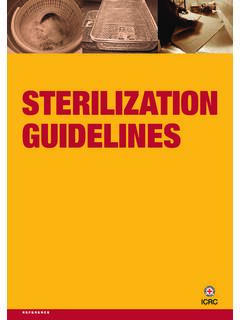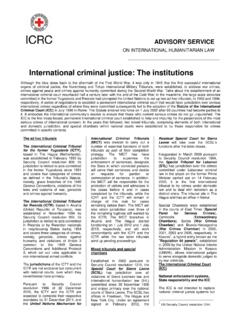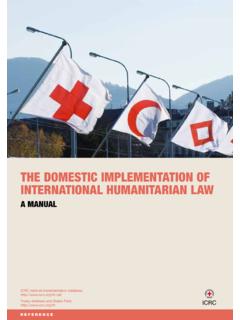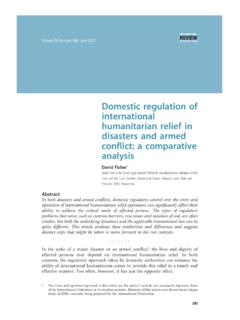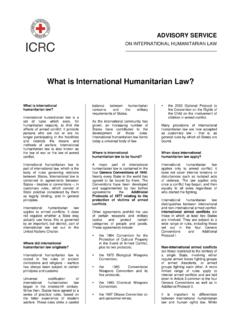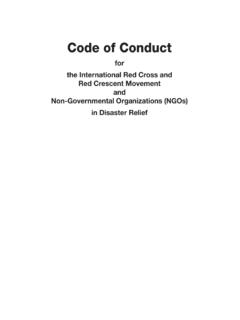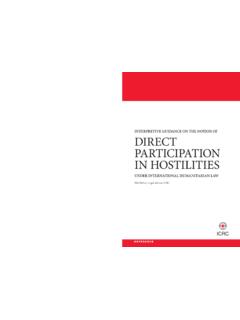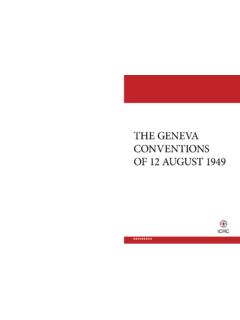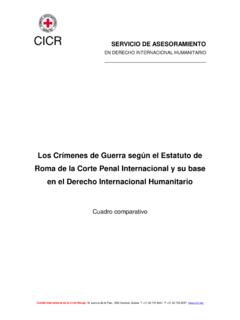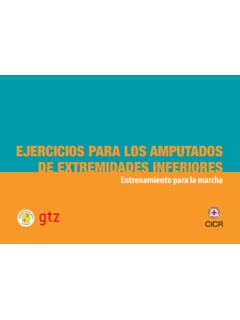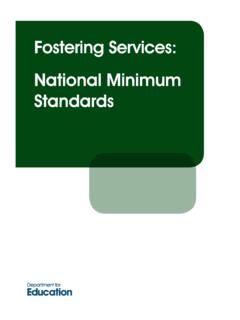Transcription of Programme/project management: The results-based approach
1 Programme/project management: The results-based approach Programme/project management: The results-based approach May 2008. 0951/002 500. PROGRAMME-PROJECT MANAGEMENT 1 17:28:46. The ICRC's Economic Security Unit would like to thank Karla Levy of Groupe URD. (Urgence, R habilitation, D veloppement) for her invaluable contribution to the development and design of this handbook and its accompanying training package. Some of the content of the handbook has been adapted from other existing materials, including the Groupe URD's Dynamic COMPAS Tutorial. PROGRAMME-PROJECT 3 17:39:33. Table of contents Jon Bj rgvinsson/ICRC.
2 PROGRAMME-PROJECT 4 17:39:36. 5. TABLE OF CONTENTS. Table of contents PART I: CONTENT 9. 1. INTRODUCTION 11. 2. results-based MANAGEMENT 13. What is results-based Management? 13. Focus on people: an ethical responsibility 15. RBM terminology 16. The results chain 16. The RBM logic 17. RBM in the ICRC: Planning for Results 18. Project Cycle Management 18. Defining projects and interventions 18. The project cycle 19. Origins of PCM 21. Aims of PCM 21. PCM principles 23. PART II: PROCESS 27. 3. THE PLANNING/DESIGN PHASE 29. 4. PROBLEM IDENTIFICATION 31. Aims of problem identification 31. Stakeholder analysis 32. Problem analysis 35.
3 What is problem analysis? 35. The problem tree 36. How to create a problem tree 37. 5. OPERATIONAL STRATEGY 43. The objective of an operational strategy 43. Analysis of the objectives 44. The objectives tree 44. How to create an objectives tree 46. PROGRAMME-PROJECT 5 17:39:37. 6. Table of contents The scope of the intervention 47. Defining the type of intervention 47. How to define the scope of the intervention 50. Identification of the most appropriate strategies 51. Comparing and studying strategies 51. Analysis of advantages and disadvantages 52. 6. INTERVENTION LOGIC 57. The objective of the intervention logic 57.
4 The logical framework 57. What is a logical framework? 57. Creation of a logframe 58. Formulating objectives 60. Analysing external factors 62. Assumptions 62. Risk assessment using the logframe matrix 65. The indicator framework 67. What is an indicator? 67. Types of indicators 68. How to define the indicators 70. 7. TOWARDS IMPLEMENTATION 73. Source of verification 73. Defining the source of verification 73. Collection of information 74. activity schedule 75. Aim of the activity schedule 75. How to compile an activity schedule 76. Programming resources 78. The monitoring system 79. monitoring 79. Design of a monitoring system 81.
5 The monitoring report 83. Fine-tuning the Programme/project plan 86. 8. BIBLIOGRAPHY 89. PROGRAMME-PROJECT 6 17:39:37. 7. Table of contents PROGRAMME-PROJECT 7 17:39:37. Part I: Content Laurent Duvillier/ICRC. PROGRAMME-PROJECT 8 17:39:40. 9. Part I: Content PART I: CONTENT. PROGRAMME-PROJECT 9 17:39:41. Introduction Alain Pentucci/ICRC. PROGRAMME-PROJECT 10 17:39:43. 11. 1 INTRODUCTION. Introduction The aim of this handbook is to introduce the user to Results- Based Management (RBM) and its application in programme/. project management. It describes the various components of RBM and Project Cycle Management and explains how to integrate and institutionalize them in field practice.
6 It guides you through the various processes and makes recommendations on how best to apply this app roach in the field. The handbook accompanies the course on Programme/. Project Management: The results-based approach organ . ized by the ICRC's Economic Security Unit (Ecosec). The course aims to strengthen the capacities of teams carrying out economic security or other similar programmes/projects to design, plan and monitor results-driven interventions. It provides tools to analyse problems and stakeholders, define objectives, determine activities and monitor interventions based on the population's needs. It is one of three Ecosec basic courses : Module 1: Assessment Module 2: Programme/project Management: The Results- Based approach Module 3: Measuring Results The course is compulsory for all Ecosec team members and is open to other practitioners, such as staff of National Societies and other ICRC units.
7 The handbook and training package were compiled in line with the ICRC's management priority number 2, which aims to reinforce RBM. PROGRAMME-PROJECT 11 17:39:43. results-based MANAGEMENT. Vladimir Melnik/ICRC. PROGRAMME-PROJECT 12 17:39:50. 13. 2 results-based MANAGEMENT. results-based MANAGEMENT. What is results-based Management? results-based Management (RBM) is a management strategy that focuses on performance and the achieve . ment of results (outputs, outcomes and impacts). The aim of RBM is to manage an intervention while trying to ensure its relevance, efficiency, effectiveness, impact and other quality criteria.
8 RBM provides a structured, logical model for identifying expected results and the inputs and activities needed to accomplish them. 25 health centres built in the Nminunga region. 250 food aid kits distributed to 250 displaced households in March 2007. Although these statistics are impressive and show the ICRC's efforts to assist a population, they focus on what was done rather than on what was achieved. They do not tell what the initial objectives were, what real changes were brought about, or the effect they had on people's lives. 250 households in the Nminunga region can safely access a health post on foot in less than 40 minutes, thereby improving the health conditions of the region's inhabitants.
9 2 50 displaced households have access to and consume at least 2,400 Kcal/day without selling the economic assets that are essential to their return home. These are objectives that focus on the people's situation. They are written with the hoped-for result in mind, and thus make it possible to measure if that result has been achieved and a difference genuinely made for the people concerned. PROGRAMME-PROJECT 13 17:39:52. 14. results-based MANAGEMENT. Note results-based Management is common sense. Plan, manage and measure what you do with a clear focus on the results you want to achieve. RBM logic 1 Assess What is the current situation?
10 2 Think What caused it? Who is involved? What are we going to achieve? 3 Plan How are we going to do it? With whom? When? With what resources? 4 Do Get it done. How is it going? Do we need to adapt? 5 Review What went well/badly? What can we learn for next time? RBM introduces a structured management approach that keeps an organization focused on the expected results throughout the process and not on the implementation of activities or on budget control. By being able to measure results, a team will better understand the value of its work. RBM changes an organization's culture. It was first conceived for the private sector.
